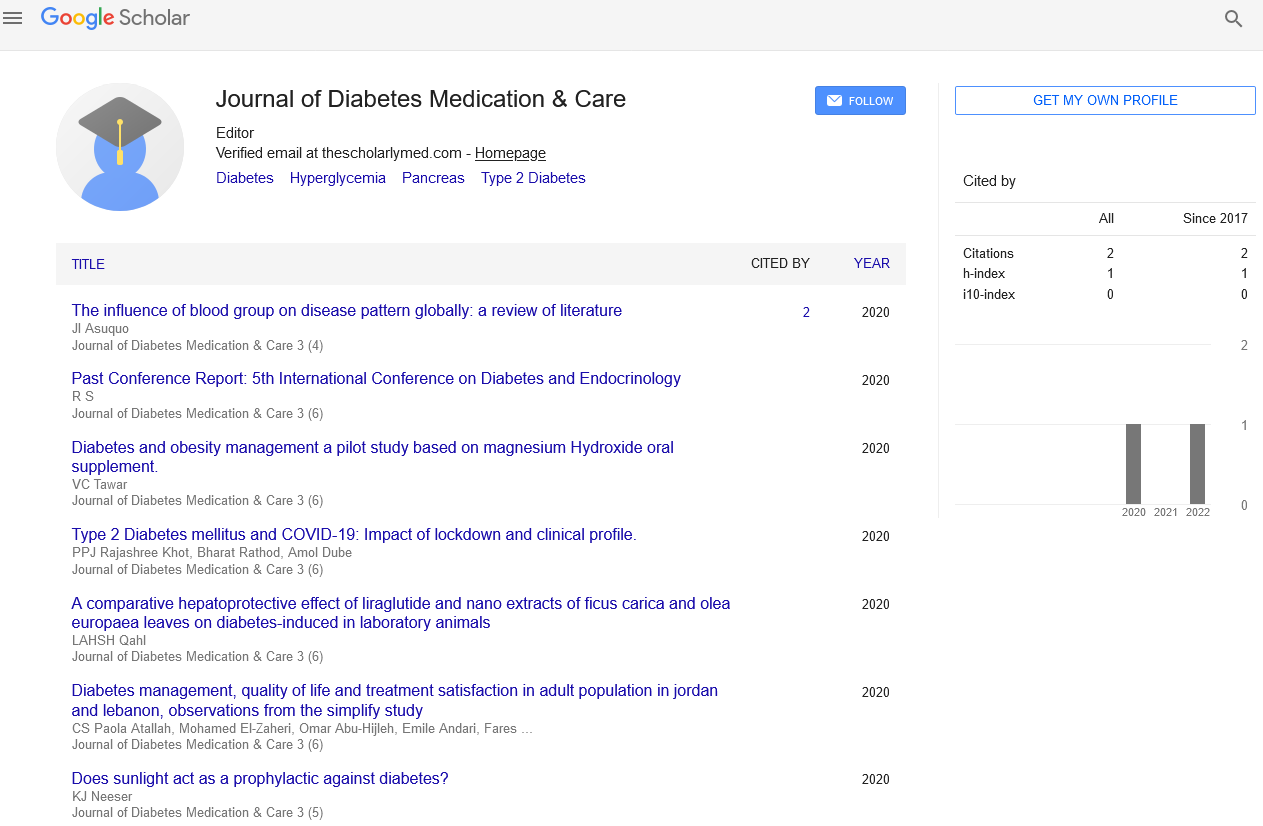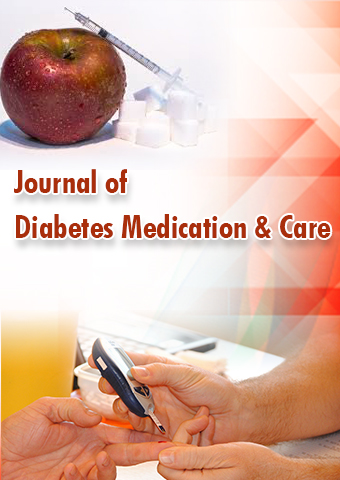Perspective - Journal of Diabetes Medication & Care (2023) Volume 6, Issue 6
Revolutionizing Diabetes Management: The Intersection of Technology and Health
- Corresponding Author:
- Kyang Ewn
Department of Endocrinology, Yonsei University, Seoul, South Korea
E-mail: kaywye@canu.ac.kr
Received: 03-Nov-2023, Manuscript No. JDMC-23-120956; Editor assigned: 06-Nov-2023, PreQC No. JDMC-23- 120956 (PQ); Reviewed: 20-Nov-2023, QC No. JDMC-23-120956; Revised: 27-Nov-2023, Manuscript No. JDMC-23-120956 (R); Published: 06-Dec-2023, DOI: 10.37532/JDMC.2023.6(6).144-145
Introduction
In recent years, the marriage of technology and healthcare has brought about unprecedented advancements in the management of chronic conditions. One such condition that has witnessed a transformative impact is diabetes. As technology continues to evolve, innovative solutions are emerging to empower individuals living with diabetes, offering new tools for monitoring, treatment, and overall well-being
Description
Continuous Glucose Monitoring (CGM) systems
One of the groundbreaking technological advancements in diabetes management is the development and widespread adoption of Continuous Glucose Monitoring (CGM) systems. CGM devices provide real-time data on blood glucose levels, allowing individuals to monitor their glucose levels continuously throughout the day. This is a significant departure from traditional glucose monitoring, which involves periodic finger stick tests.
CGM systems typically consist of a small sensor inserted under the skin that measures glucose levels in the interstitial fluid. The sensor sends this data to a receiver or a smartphone app, providing users with instant feedback on their blood sugar levels. This real time information enables better-informed decisions about food choices, insulin dosages, and other lifestyle factors, leading to improved glycemic control.
Artificial intelligence and predictive analytics
The integration of Artificial Intelligence (AI) and predictive analytics into diabetes management has further elevated the precision and efficiency of treatment plans. AI algorithms analyze the vast amounts of data generated by CGM systems, insulin pumps, and other connected devices to identify patterns and trends in an individual’s glucose levels.
By leveraging machine learning, these systems can predict future glucose fluctuations and alert users to potential highs or lows before they occur. This predictive capability empowers individuals to take proactive measures, such as adjusting insulin doses or making dietary changes, to maintain stable blood sugar levels. This not only enhances the quality of life for those with diabetes but also reduces the risk of complications associated with poorly controlled glucose levels.
Insulin delivery systems
Traditional insulin delivery methods, such as injections, have been revolutionized by the introduction of insulin pumps. These small, wearable devices provide a continuous and customizable flow of insulin throughout the day, mimicking the natural insulin secretion of a healthy pancreas. Users can adjust basal rates and administer bolus doses as needed, offering greater flexibility and control over their insulin therapy.
Furthermore, the convergence of insulin pumps with CGM systems has given rise to hybrid closed loop systems, also known as artificial pancreases. These systems automate insulin delivery based on real-time glucose data, reducing the burden on individuals to manually adjust their insulin doses. The result is tighter glycemic control and a reduced risk of hypoglycemia, enhancing both the safety and efficacy of diabetes management.
Mobile apps and telehealth
The proliferation of smartphones and mobile applications has facilitated the development of diabetes management apps that empower users to track and analyze various aspects of their condition. These apps often sync with CGM systems, insulin pumps, and other devices to consolidate data in one accessible platform. Users can log meals, monitor physical activity, and receive personalized insights to optimize their diabetes management strategies.
Additionally, telehealth platforms have become integral to diabetes care, allowing individuals to connect with healthcare providers remotely. Through virtual consultations, patients can receive timely guidance on medication adjustments, lifestyle modifications, and overall diabetes management. This not only enhances accessibility to care but also encourages regular communication between patients and healthcare professionals, fostering a collaborative approach to diabetes management.
Gamification and behavioral change
Recognizing the importance of sustained behavior change in diabetes management, technology has embraced gamification strategies to motivate and engage individuals. Gamified apps and devices incorporate elements of competition, rewards, and goal setting to make the process of managing diabetes more interactive and enjoyable.
For instance, users may earn points for achieving target glucose levels, adhering to medication regimens, or meeting fitness goals. These gamification elements can positively influence adherence to treatment plans and foster a sense of achievement, ultimately contributing to better long-term outcomes for individuals living with diabetes.
Challenges and considerations
While the integration of technology into diabetes management offers significant benefits, it is not without challenges. Accessibility, cost, and the learning curve associated with adopting new technologies are barriers that need to be addressed to ensure equitable access for all individuals with diabetes. Moreover, the security and privacy of health data generated by these technologies are paramount concerns that require ongoing attention and regulation.
Additionally, the rapidly evolving nature of technology necessitates ongoing education and support for both healthcare providers and individuals with diabetes. Keeping abreast of the latest advancements and understanding how to effectively integrate these technologies into personalized care plans is crucial for optimizing their impact on diabetes management.
Future directions
As technology continues to advance, the future of diabetes management holds even more promise. Innovations such as smart insulin, which adjusts its activity based on glucose levels, and implantable glucose-responsive devices are on the horizon. Moreover, the intersection of genomics and personalized medicine may further tailor diabetes treatments to individuals based on their genetic makeup.
Conclusion
In conclusion, the symbiosis of technology and diabetes management is reshaping the landscape of care for individuals with diabetes. From continuous glucose monitoring to artificial intelligence driven insights, these advancements are not only improving glycemic control but also enhancing overall quality of life. As we look to the future, the ongoing collaboration between healthcare professionals, technology developers, and individuals with diabetes will be crucial in unlocking new possibilities for more effective and personalized diabetes care.

